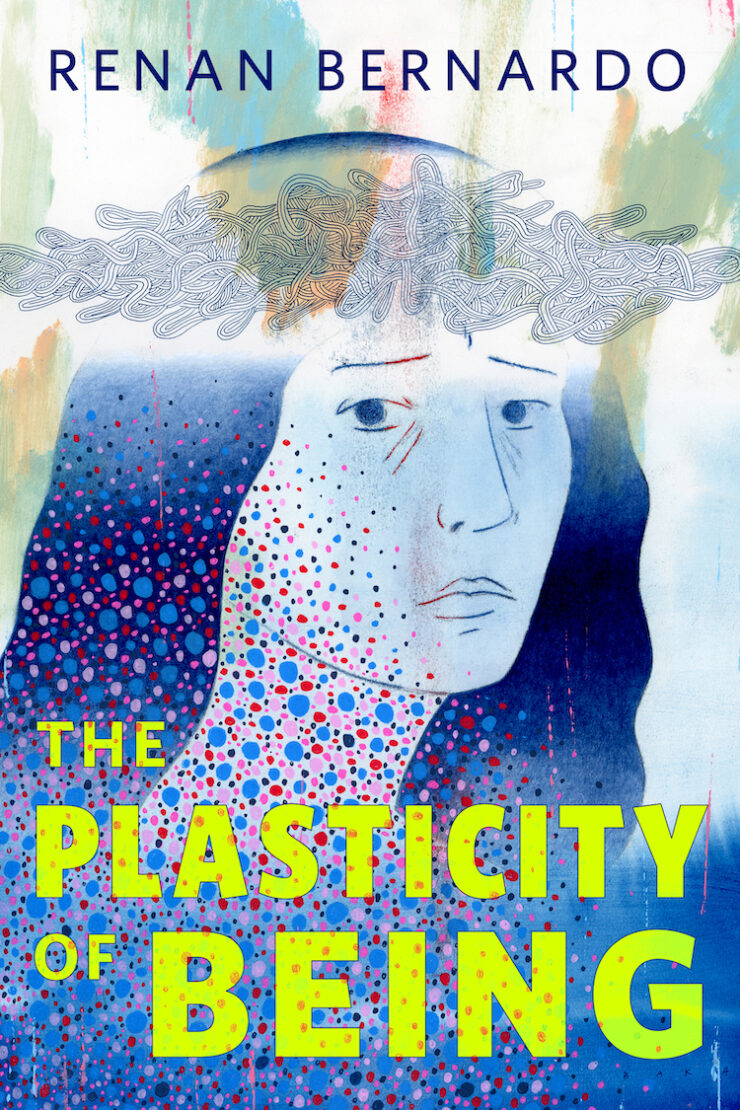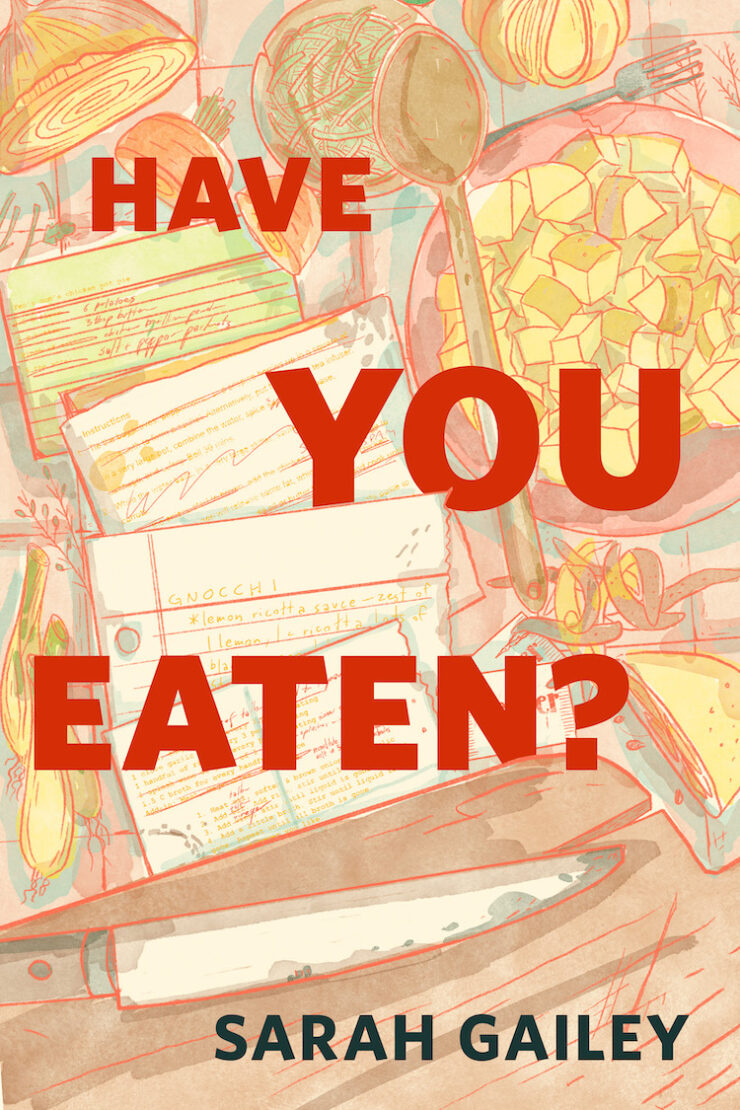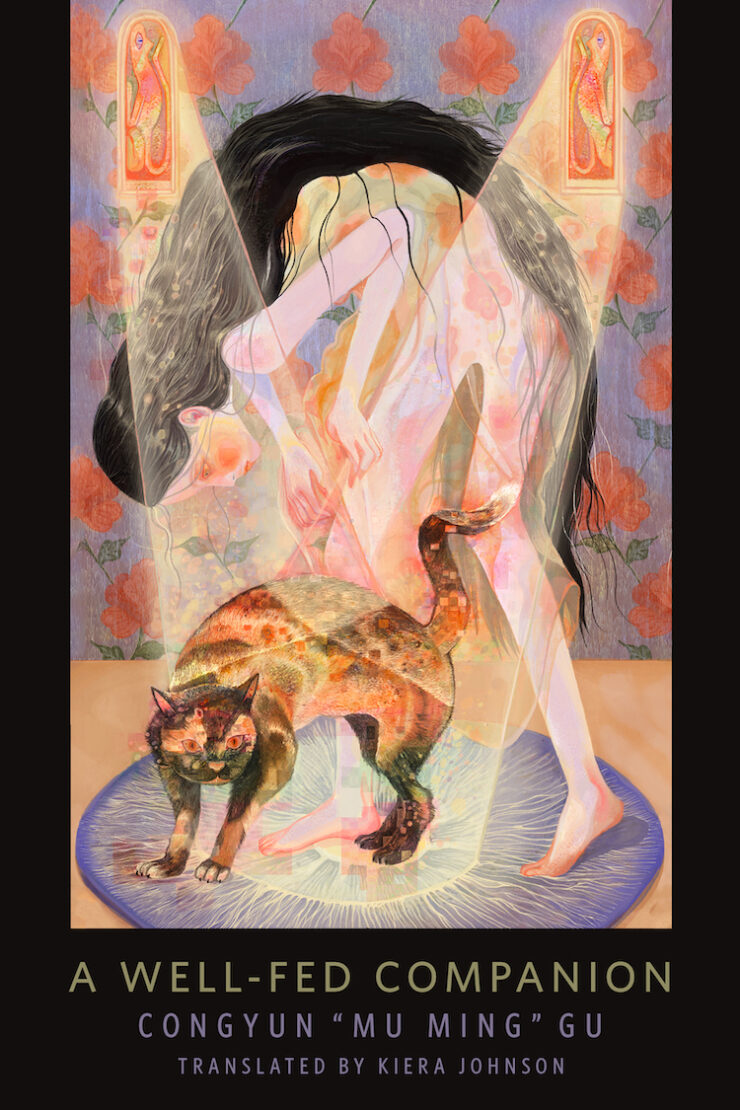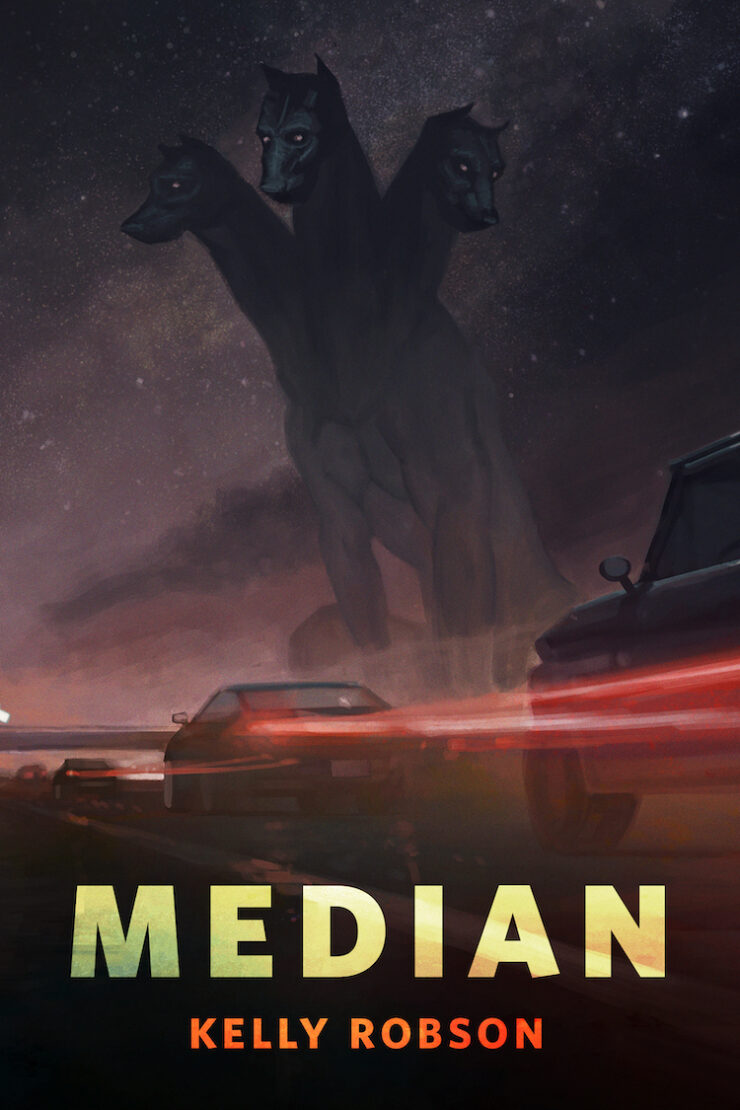Reading poetry sometimes feels like battling a giant squid: overwhelming, disorienting, and more than a little slippery. Poems can be elusive beings, evading comprehension and dissection. When you take an already chimeric beast and give it appendages of fantasy, science fiction, horror, or mythology—well, then it becomes another monster entirely.
Even just a few years ago, I would steer clear of poetry tables at book festivals, feeling that it was too frustrating of an artform to fully grasp. But now writing and reading poetry is a weekly pleasure for me, and I recently read the 2021 Rhysling Anthology—which specifically celebrates speculative poetry—from cover to cover.
What sparked my transformation? Following these two maxims unlocked my mind:
1. You don’t have to like ALL poetry.
This may seem obvious, since it’s not like you need to enjoy two hundred flavors in order to say you like ice cream. However, I’ve heard readers say, “I don’t really like fantasy” when the only fantasy they’ve read is Harry Potter or Lord of the Rings. It’s easy to dismiss an entire category after only a few samples. If you generally dislike mainstream poetry, speculative poetry could be your gateway into verse.
One of the first poetry collections I truly enjoyed was the Pulitzer Prize-winning Life on Mars by Tracy K. Smith—an ode to the universe, David Bowie, and 2001: A Space Odyssey. Even though much of it was nonsensical to me at first, it was delicious nonsense, with honeyed phrases and tender images that I chewed on for days, especially the opening lines of “Don’t You Wonder, Sometimes?”
“After dark, stars glisten like ice, and the distance they span
Hides something elemental. Not God, exactly. More like
Some thin-hipped glittering Bowie-being—a Starman
Or cosmic ace hovering, swaying, aching to make us see.”
2. Don’t aim to understand poetry; strive to experience it.
When I stopped treating poetry as if it were prose—quit mining for a coherent narrative, for a clear message—my frustration evaporated. I embraced uncertainty and even found joy in never completely untangling a poem’s meaning, allowing a sense of mystery to linger. Although poems can tell a story, poetry is predominantly a language-driven form where sound and sensation intersect.
Take a look at this stanza from Amal El-Mohtar’s Rhysling Award-winning poem “Peach-Creamed Honey,” which begs to be spoken aloud (in fact, you can listen to El-Mohtar perform the poem here):
…They say
she likes to tease her fruit, bite ripe summer flesh
just to get that drip going
down, down,
sweets her elbow with the slip of it,
wears it like perfume.
This poem comes from El-Mohtar’s collection The Honey Month, in which twenty-eight flavors of honey are paired with tasting notes and literary reflections that belong in the realm of fairy tales. “Peach-Creamed Honey” is a sensual poem laced with innuendo, where every word sounds like an act of temptation and seduction.
Speculative poetry is a hybrid creature that combines elements of poetry and prose, in addition to blurring the line between realism and fabulism, giving it a unique approach that no other medium can replicate.
“Mainstream” vs. Speculative Poetry
To better understand what speculative poetry can achieve, we can put it under a microscope and see how this subgenre differs from mainstream poetry. Many classic poems from days of old could be said to have speculative elements: Edgar Allan Poe’s “The Raven” and Christina Rossetti’s “Goblin Market,” for example, and even the epic poems of Beowulf and The Odyssey, with their tales of hauntings, goblin fruit, dragons, and sirens. (Theodora Goss’ website “Poems of the Fantastic and Macabre” has an inexhaustive list of these types of older works.)
Speculative poet Bruce Boston emphasizes the difference in subject matter and the “stance” of the poet in his distinction between the two forms:
Mainstream poetry deals with the rendering and exploration of the here and now, reality as we know it, internal and external. The poet is often present in the poem as an ‘I’ voice, explicitly or implicitly. Speculative poetry has more to do with imagination, the world of dreams and the world as it could be. The stance of the speculative poet is closer to that of a fiction writer. If an ‘I’ voice appears in a speculative poem it is usually that of a fictional character rather than the author.
The two forms aren’t really a dichotomy so much as they are a spectrum. In contemporary poetry, some poets will reject the “speculative” label even when their work uses fantastical elements, whereas certain poems featured in science fiction and fantasy magazines don’t feel very speculative at all. The label isn’t as important as the poem’s effect.
All poetry shares the broader purpose of defamiliarization—casting the familiar in an unfamiliar light so that we can find fresh meanings, new wrinkles and scars in faces we’ve known our whole lives. As writer Stephen Moss put it, “A good poem looks closely at the world; does that Martian thing of trying to see it for the first time. Everything else—the emotional charge, the lyrical delight, the intellectual pleasure—is secondary.”
So, if poetry’s purpose is—at least in part—to paint the familiar in an unfamiliar light, then what happens when the subject matter is also deeply unfamiliar, or doesn’t even exist? The effect is often an added layer of defamiliarization. Speculative poetry transmutes the ordinary into the extraordinary, supercharging the reader’s attention on one particular idea or image.
The ocean and love are familiar enough elements in poetry, and they’re spotlighted in Fran Wilde’s “The Sea Never Says It Loves You” published in Uncanny Magazine. However, it’s in how Wilde presents “you” as the lover of an uncaring sea that we view the familiar through an unfamiliar prism. The poem feels playful in its absurd premise (“You could go to school with the sea / You might pass it in the hall”), yet grows more melancholy as it continues, ending on the dissolution of the relationship:
And you are bathed in salt spray, wishing.
Wishing you were water,
or that the sea would whisper from a shell the name of the first song
you danced to
Or say the name it gave you before it swallowed you up.
What speculative poetry can do that mainstream poetry can’t is heighten the experience of the unfamiliar by twisting reality into new shapes. Through that subversion of the real, we can stare into the pool at our own reflections and better understand what we see.
Opening my mind to these possibilities revealed the varied powers that speculative poems can wield: to imagine, to delight, to ignite, and to converse.
To Imagine
a bloodied clutch of crowns, leaf-clashed,
coin-profiles chinking a child’s singsong,
the one pure silence staring
like a hacked man’s throat into the blade.
What the hell did I just read?!
That was my first reaction, anyway. The second is “I want to read this aloud, over and over again.” These lines from Sonya Taaffe’s poem “Radio Banquo” in Strange Horizons seem to present Banquo’s death from Shakespeare’s Macbeth as a radio broadcast, the diction filled with allusions to the Bard with “furious nothing” and “signal ghosting.” For me, the poem’s gravitational pull comes from that unexpected juxtaposition of old and modern. The poet gifts me with a sensory experience that I couldn’t have imagined on my own.
Warping time and place in speculative poetry can be a way for us to reexamine our relationships with each other and the world around us. In C.S.E. Cooney’s “Postcards from Mars” in Stone Telling, the narrator’s mother takes a one-way trip to Mars after saving up every penny, sending back monthly postcards to Earth. The narrator pretends her mom is dead instead—until she discovers that her mom has disappeared on Mars, and the poem ends on a bittersweet note:
I study her postcards —
Search for clues, secrets, whisperings
Footprints in the red, red dust.I finish the jam, wash out the jar.
Three pennies, a dime and a quarter so far.
This poem invites the reader to examine a complex mother/daughter relationship, creating an even greater emotional distance between characters by using Mars as a setting. As poet Theodora Goss has said, “…every story or poem we write is necessarily about us, whether it involves dragons, robots, or accountants. We can’t help writing about our world, however obliquely. We can’t escape our context.”
As in speculative prose, speculative poetry lets us imagine new societal structures, voice warnings about potential futures, and envision identity, gender, and sexuality through a lens that’s unencumbered by our present reality. We can explore our hopes and fears through the hyperbole of strange worlds and what they challenge us to reconsider about our current lives—a way to “tell all the truth but tell it slant.”
To Delight
A poem doesn’t need to be serious or groundbreaking to fulfill its purpose. Some poems are solely designed to entertain: to inspire a smile at a surprising turn of phrase or an appreciative sigh at a poignant image. Narrative poems that tell a story with a beginning, middle, and end can feel like morsels of microfiction that have been artfully arranged to guide the reader’s experience.
Mary Soon Lee’s The Sign of the Dragon is an epic fantasy story told through over three hundred poems, and Lee crafts each poem in a way that allows for a new discovery in how storytelling can be experienced. One poem jumps between snippets of conversations the new king has with his tailor, stableboy, and generals as he prepares for his succession. Another poem is written from the perspective of the king’s horses. Battle scenes are painted in impressionistic strokes to capture the chaos:
(Before, an instant earlier,
Tsung’s pulse pounded loud
as the wind’s wet rush,
as the clash of metal on metal,
as the screams, the battle drums,
whilst Tsung rode beside the king,
the horses maneuvering
as if they were a thousand shadows
of a single faultless form—
That continual string of novelty in form and language feels like dancing at a masquerade ball with a dozen different partners.
Tim Pratt’s “Soul Searching” in Strange Horizons also plays with form to deliver whimsical surprises (this poem also won the 2005 Rhysling Award). It opens:
On weekends I help my old neighbor look
for his soul. He says he used to be a wizard, or a giant
(the story varies from telling to telling), and, as was
the custom for his kind, he put his soul into an egg
(or perhaps a stone) for safe-keeping. He hid the egg
(or stone) inside a duck (or in the belly
of a sheep, or in a tree stump)
The enjambment with the first line gives us this seemingly normal premise (“On weekends I help my old neighbor look”), which is immediately subverted as our eyes jump to the next line (“for his soul”). It’s like the turn in the punchline of a joke or the cherry cordial when you bite into a chocolate truffle—that instant sweetness of surprise. Poetry encourages creative risks, leading to unexpected uses of language and punctuation, like the way Pratt’s parentheses create the effect of forgetfulness that the narrator must be hearing in the older man’s dialogue.
This poem also underscores why speculative elements can be essential. By untethering the poem from reality, the poet has access to fresh imagery, like picturing a soul hidden in an egg that’s been hidden inside a sheep. The literal take on “soul searching” makes the abstract concrete.
It’s a whimsical but deeply sad poem, as the old neighbor eventually explains that he wants to break the egg so that he can finally lose his immortality and die. Even when poems tell a story in an accessible style, they can touch on deeper truths about nebulous concepts such as heroism and war, mortality and old age.
To Ignite
All words are fightin’ words.
In her insightful Tor.com article “How to Read Poetry 101,” Amal El-Mohtar shares the story of her poet grandfather who was imprisoned in Lebanon for his political views, which forever shaped her view of poetry’s purpose:
I grew up being taught that poetry is the language of resistance—that when oppression and injustice exceed our capacity to frame them into words, we still have poetry.
Adding speculative elements to resistance poetry can amplify its intensity. I was struck by the use of a science fiction framework when I first read Franny Choi’s poem “Introduction to Quantum Theory” from her collection Soft Science, which begins, “There are only so many parallel universes / that concern us.” From that premise, she imagines a universe “in which our mothers haven’t learned to wrap / their bones in each small grief they’ve found,” and a universe where “no one’s child washes / blue, ashore.” Choi highlights the absence of certain features in other universes as a way to remind us of the failings in our own.
When I read poetry, I’m seeking out that shock to the nervous system. “Birth, Place” by Brandon O’Brien in Uncanny Magazine embodies that idea right from the title, with its separation of “birth” and “place.” Immediately, you know that this is going to be a poem about identity and the loss of homeland. Even from the opening stanza, O’Brien pulls no punches:
I made this land myself.
I put dirt in my own
mouth and hoped it
would mature; you made
manure of the bodies
of our mothers, asked
us to chew the remains,
The poem invokes the orishas of healing and rivers in the creation of the land. It feels like a story of displacement in the wake of colonization (“Your legacy’s already drowned me”), and the narrator is reclaiming that ancestral land—land that is an extension of the body, the dirt in their mouth, home caked around them. Amongst the whispering spirits and the rebuilding of a planet shines a hope for future generations in the poem’s powerful final lines:
I will plant a time I cannot see
for children I will not know
among those bones,and what grows, laughing,
will not be as easy to pluck
as I once was.
Speculative poems present a challenge: look inward and reexamine the way you see the world.
To Converse
Listen closely enough and you can hear artists talking to each other through their art, whether to their contemporaries, or creators long dead, or to future generations. Verse is a vehicle for conversations about genre tropes or touchstones.
Feminist retellings in poems reimagine fairy-tale figures with greater agency, subverting stories that are part of our collective consciousness. In the titular poem from her collection Snow White Learns Witchcraft, Theodora Goss imagines what Snow White’s life might be like in old age, after she marries the prince and has a daughter of her own. Who is she now that she’s in the “Evil Queen’s” position as a beautiful woman whose hair has become “as white as snow”?
I’ll walk along the shore collecting shells,
read all the books I’ve never had the time for,
and study witchcraft. What should women do
when they grow old and useless? Become witches.
It’s the only role you get to write yourself.
These retellings are another type of defamiliarization, taking the “familiar” out of familiar stories. Speculative poems converse with stories outside the genre, too, like how Dominik Parisien’s “A Portrait of the Monster as an Artist” in Mythic Delirium is a clear play on James Joyce’s A Portrait of the Artist as a Young Man. Brandon O’Brien’s “Cento for Lagahoos” in Strange Horizons borrows from twenty other poets; he took familiar pieces and composed new meaning from them, conversing with the realm of poetry as a whole. Instead of erasure poetry, it’s highlight poetry.
The challenge and inventiveness of Sherese Francis’ poem “Celestial Mary (Galilean Daughter)” in Apex Magazine comes from how the poem puts itself in conversation with the Bible, focusing on Mary’s perspective on a metaphysical level. Two stanzas appear side by side, making the poem feel like a conversation, followed by a centered stanza. Forward slashes break words into units of sound or meaning, which has a disorienting effect:
a here/tic: one with free will to choose
ooooooodis/urn/er of dogma
oooooodivine wil/l/d power
Through innovations in form and content, speculative poetry furthers what’s possible in the genre.
The Future of Speculative Poetry
We gain so much more from poetry when we stop fighting the giant squid and instead marvel at the way it dances in the deep and let it drag us off into the depths. I’ve always been in love with language, but poetry reshaped the way I thought about how the world can be experienced through a handful of words—and for me, that’s the true purpose of speculative poetry.
If you’d like to dive into the genre, the Rhysling Anthology is a fantastic way to sample a variety of voices, as are the panoply of amazing magazines mentioned throughout this article. I also highly recommend FIYAH Literary Magazine, Polu Texni, Speculative North, Augur, Asimov’s, and The Future Fire, and the archives of Goblin Fruit and Liminality, among others.
The future of speculative poetry is in your hands—because it’s only through reading the words that we give them life.
Originally published July 2021.
Diane Callahan spends her days shaping stories as a writer and developmental editor. Her YouTube channel, Quotidian Writer, provides practical tips for aspiring authors.










